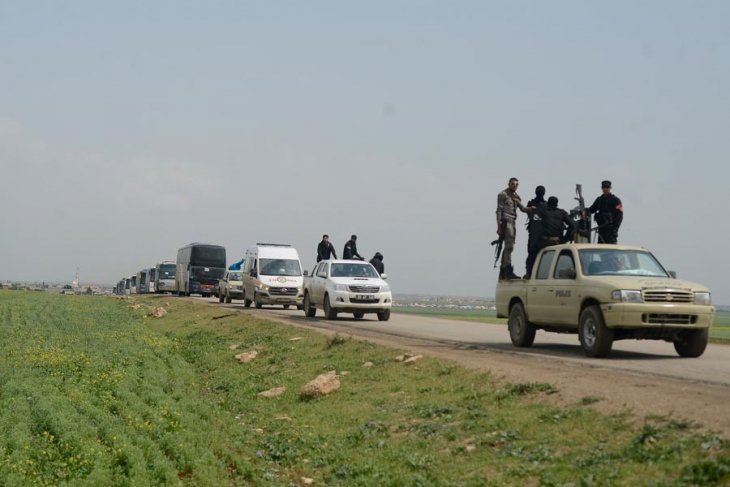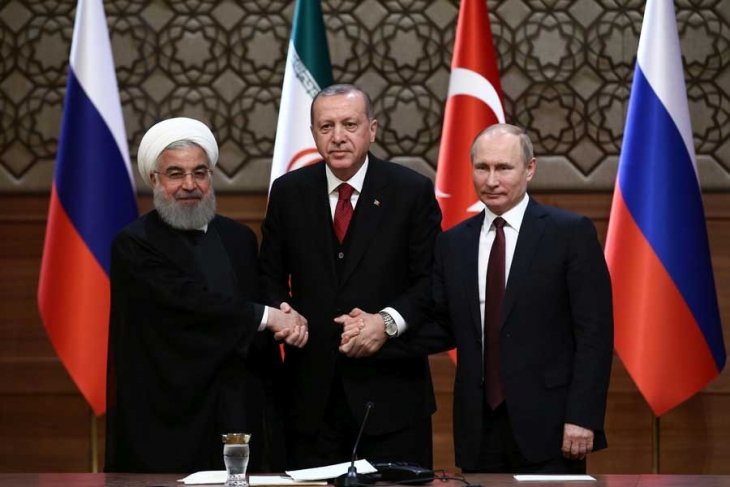One of the questions that arise at this juncture is the kind of position Turkey will take on the face of a possible conflict between US and Russia.
Tensions escalated following the claim that the regime forces conducting an operation against jihadist groups have used chemical weapons in Eastern Ghouta in Syria have brought the US and Russia to the brink of war. While the US president Trump was threatening Russia with the tweet “get ready, our new smart missiles on their way,” Russia which has declared before that it will not leave any missile offensive against Syria unanswered, replied that “smart missiles should target the terrorists and not the official government.”
In the meantime, Iran has declared that it will take a position against a possible intervention in Syria with its statement that “it will stand with Syria against any foreign intervention.” However, this exchange of statements was also followed by further steps. While the US warships began to make way for the Mediterranean, Britain which has declared its open support for a US intervention has been sending war planes to its base in Cyprus.
While these very developments increasing the possibility of a direct confrontation in Syria were well underway, the news that the regime forces have secured complete control of Eastern Ghouta, turned into the grounds for this tension, have arrived. However, it is evident that the real question for the forces threatening an intervention in Syria is not Eastern Ghouta or the chemical weapons allegedly used there –and indeed this claim being a design of the ‘White Helmets’with links to Al Qaida, as stated by the Russia delegation that has carried out an inquiry in the area, is a likelypossibility. On the contrary, the real issue is that the process of elimination of the jihadists forces, the end of which has been reached, has facilitated the increased influence of Syria and the forces it has been cooperating in the region (Middle East) such as Russia and mainly Iran. Hence, the reason why the US and its allies have embraced the claim that chemical weapons have been used in Eastern Ghouta without any research is the attempt to turn this claim into the grounds for an intervention in the region with the purpose of curbing the increasing Russian-Iranian influence over it.
One of the first questions that arise at this juncture is the kind of position Turkey will take on the face of escalating tensions and a possible conflict in between the US and Russia, that is, the side it will take. For, despite its fractious political relations with the EU, almost 50% of Turkey’s foreign trade is with the EU (if the US is also considered in tandem, this figure exceeds the 50%). And besides, militarily it sustains its existence as a NATO member. On the other hand, the government in Turkey has been developing its military, trade and political cooperation with Russia since the coup attempt in 2016.
We may, in that case, ask: what is Turkey’s position in Syria the current focus of conflicts and the struggle for domination?
The US developed its relations with the Kurds who have waged the most active struggle against ISIS in the process when it began to take steps to preserve its position against Russia in the region on the basis of its “Fight against ISIS Strategy.” This cooperation has brought Turkey and the US to loggerheads, with the former viewing the empowerment of Kurds within Syria as a threat in terms of the policy it has been ensuing in relation to the Kurdish question in Turkey. The liability ascribed to the US and the west by the Erdogan government for the 15 July 2016 coup attempt, increased the possibilities for Russia to use Turkey against the US and the west despite its tense relations until then. On this basis, Russia, gave ‘the nod of approval’ to Turkey’s operations in Syria ranging from the ‘Euphrates Shield’ to Afrin operation undertaken in appearance against the ISIS but in reality for the prevention of the unification of the Kurdish cantons (Kobanê and Afrin). This is because Russia, based on this policy, was aiming to convince Kurds to its solution through a limitation of their power while making it difficult for the US trying to settle in Syria by forcing Turkey, a NATO member, to come to loggerheads with the US.
As for today: forces ranging from the Free Syrian Army used in Afrin operation to jihadist groups Ahrar al-Sham and Nour al-Din al-Zenki Movement supported in Idlib has become the most important footholds of Turkey’s policy of intervention in Syria. For this reason, the Erdoğan government, even in the most fractious periods with the US and the west, supported the intervention of these forces against the Syrian regime (Asad). For instance, in the April of last year, in the statement made about the US strike on the Syrian Shayrat Airbase following claims of the use of chemical weapons in the Khan Shaykhun district of Idlib, assurances were provided that “Turkey completely supports steps taken in this direction.” The calculation was simple enough, because steps taken to cease and drive back Asad’s operations against jihadists groups would result in the broadening of the leeway for Turkey and the jihadists groups, and provide the conditions for their figuring more actively in determining the future of Syria.
However, the matter has a different dimension too. Turkey’s support for the US-west policy of intervention in Syria will inevitably endanger the relationship and cooperation it has been sustaining with Russia and Iran supporting Asad openly. Moreover, this situation will also lead to the ending of the operations and policy of interventions Turkey has been ensuing in Syria against the Kurds which has been possible only with the ‘approval’ of these forces.
In other words, the government in Turkey is heading towards a point where it will be progressively more difficult to exploit the contradictions in between two forces fighting for domination in Syria and where it would inevitably face this impasse whichever direction it will turn. And furthermore, because of this policy of war and intervention ensued by the government, wherever/whoever becomes Turkey’s side, the dragging of the country to the centre of a regional war in between imperialists is becoming more and more inevitable.
Well, is there no way out?
There is, to be sure, but this way is one which does not want to be seen, would not want to be seen by the current government that has made the construction of a one-man regime internally and the intertwined expansionists-aggressive policies in the foreign front a raison d’être for itself. This way is the one grounded on giving up the interventionist-expansionist policies in the foreign front and the cessation of support to jihadists groups, with primarily the Free Syrian Army, while in the home front, on the bringing to an end of the Martial Law (OHAL), progressing democratisation and the peaceful resolution of the Kurdish question.

